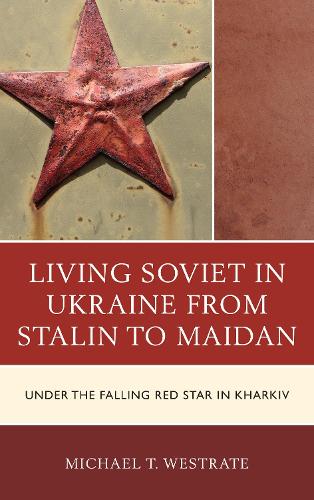
Living Soviet in Ukraine from Stalin to Maidan: Under the Falling Red Star in Kharkiv
(Paperback)
Available Formats
Publishing Details
Living Soviet in Ukraine from Stalin to Maidan: Under the Falling Red Star in Kharkiv
By (Author) Michael T. Westrate
Bloomsbury Publishing PLC
Lexington Books
28th May 2019
United States
Classifications
Professional and Scholarly
Non Fiction
947.75
Physical Properties
Paperback
250
Width 153mm, Height 220mm, Spine 18mm
376g
Description
What the world is now witnessing in Ukraine is the cumulative effect of history and memory in the lives of the people of the regionand this book directly addresses those subjects. Although the majority of scholarship on the Soviet Union focuses on top-level political and intellectual elites, these groups were only tiny minorities. What was life like for the rest of society What was it like for the vast population that usually supported the regime, mostly accepted the rules, essentially internalized the ideology, and generally made the same choices as their neighbors and friends What was it like to live Soviet as the USSR hit its peak as a superpower and then fell apart What was it like to live Soviet in Ukraine in the decade after independence This book answers those questions. It is an oral history of a group of military colonels and their wives, children, and contemporaries, covering their lives from childhood to the present. During this period, these military families went from comfortable economic circumstances, professional prestige, and political influence as part of the Soviet upper stratum, to destitution and disgrace in the 1990s. Today, many of them are part of Europes largest ethnic minorityRussians in Ukraine. The geographic focus is Kharkiv, the second-largest city in Europes second-largest country, a Russian-speaking city in eastern Ukraine. Based on 3,000+ pages of interview transcripts and supplemented with materials gleaned from unprecedented access to personal, family, and institutional archives, the book investigates how families endured shifting social, cultural, and political realities. By analyzing the lives of individuals in context, Westrate provides insights at the grassroots level. He reveals how ideological, professional, gender, ethnic, and national imperativesas developed and transmitted by eliteswere internalized, transformed, or rejected by the rank and file. He reveals how the subjective identities of individuals and small groups developed and changed over time, and how that process relates to the parallel projects pursued by the leaders of their countries. In the process, he shows what those experiences have to offer the study of Soviet, post-Soviet, and transnational history, bridging the boundaries created by the collapse of the USSR and exploring the foundations of both twenty-first-century Ukraine and todays conflicts.
Reviews
Michael T. Westrates monograph is extremely timely. His fascinating microhistorical study using oral history methods examines what Soviet identity meant to those who professed it, both in the run-up to and after the collapse of the Soviet Union... All in all, this a concise and readable monograph that provides a compelling insight into a very particular milieu of Soviet society. * Europe-Asia Studies *
[T]his is a useful source of information about Soviet military elite attitudes and beliefs.... It is a strength of the volume that each chapter includes an informative survey of the existing literature, complementing the information obtained from the interviews. * Slavic Review *
Westrate has produced something rare and extremely valuable: a work based on years of painstaking ground-level research in Ukraine which is both an excellent, accessible piece of writing in itself, as well as a scholarly invaluable work. Refreshingly free of the distant punditry too often parroted about the Soviet Unions collapse, his research arsenal is loaded with painstakingly collected personal histories. The study of the personal attitudes of members of one of the USSRs elite armed forces academies speaks volumes about how the former Soviet Unions formal dissolution is even today an ongoing process in which psychology, emotions, and disruptions play a central role. Given the current new Cold Waras some have labeled itbetween Russia and the West and the ongoing conflict in Ukraine, this is a must read for policymakers, students of the region, and general readers alike. -- Lawrence Scott Sheets, author of Eight Pieces of Empire: A 20-Year Journey Through the Soviet Collapse
Living Soviet in Ukraine from Stalin to Maidan: Under the Falling Red Star in Kharkiv is an intriguing oral history that provides numerous insights into the Soviet way of life. It covers the lives of the two generations of the Soviet military officers and their families in Kharkiv, Ukraine, the quintessence of the Ukrainian-Russian historical and cultural borderland, now lost in the grey zone between the Soviet and post-Soviet epochs. Recent events reveal the importance of the complex historical and cultural legacies of the Kharkiv borderland region with its overlapping Russian, Soviet, Orthodox, Ukrainian, and regional identities. -- Volodymyr V. Kravchenko, University of Alberta
Author Bio
Michael T. Westrate is on the faculty at the University of Notre Dame.
